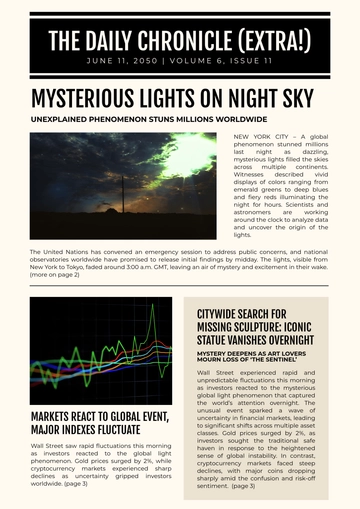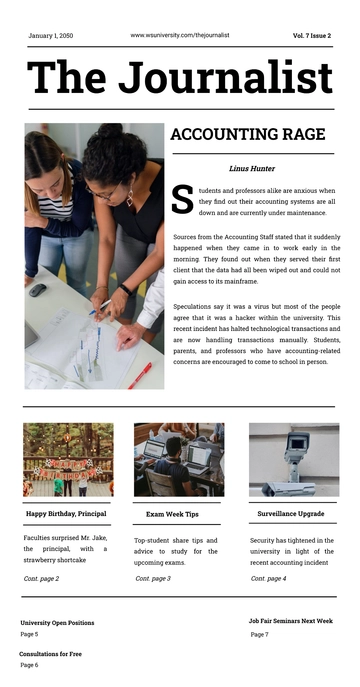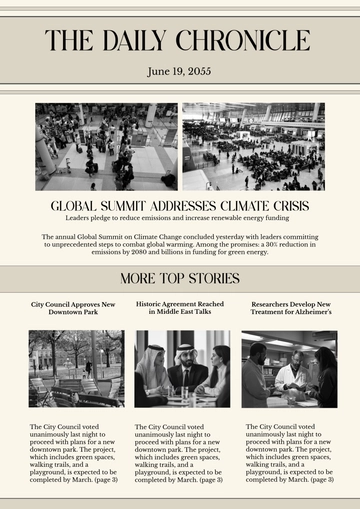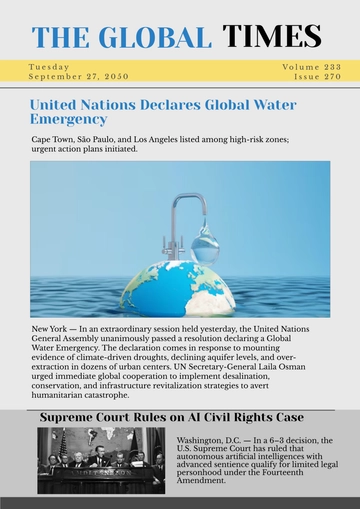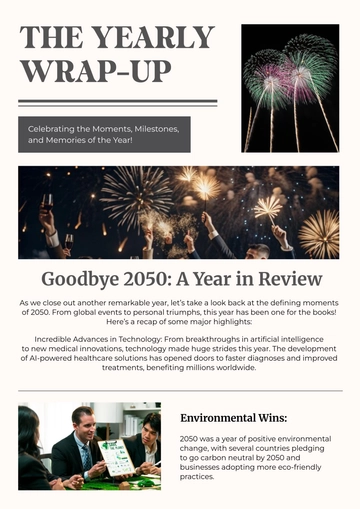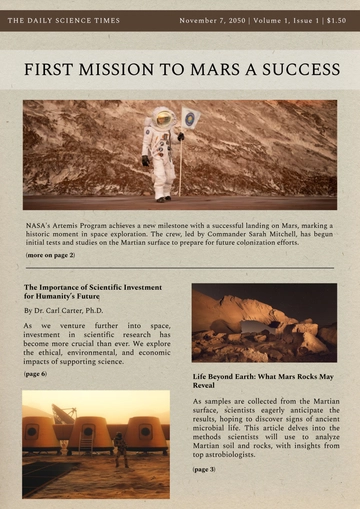Free Newspaper Front Page Article

Prepared by: [Your Name]
Date: [Date]
Record Heatwave Grips the Nation: Unprecedented Highs and Environmental Impact
1. Introduction: A Historic Heatwave Unfolds
An intense and historic heatwave that has swept across the nation has marked this summer, setting records and pushing the limits of local and national infrastructure. With temperatures soaring to unprecedented levels, communities are grappling with the immediate effects and long-term consequences of this extreme weather event. This article delves into the impact of the heatwave, the response from authorities, and the broader implications for our environment and daily lives.

2. The Numbers: Record-Breaking Temperatures
Recent data from the National Weather Service reveals that over 100 cities across the country have experienced record-breaking temperatures in the past month. The highest recorded temperature was a staggering 122°F in Phoenix, Arizona, surpassing the previous record by 4°F. This extreme heat has not only caused discomfort but has also led to numerous health advisories and warnings.
Key Statistics:
Record Highs: 122°F in Phoenix; 115°F in Dallas; 110°F in Los Angeles
Average Increase: Temperatures have risen by 6-8°F above historical averages in many regions
Heat Advisories: Issued in over 300 counties nationwide
3. Health Impacts: A Growing Concern
The heatwave has taken a significant toll on public health. Emergency rooms are reporting a surge in cases of heat-related illnesses such as heat exhaustion and heat stroke. Vulnerable populations, including older adults and those with pre-existing conditions, are particularly at risk. Public health officials are emphasizing the importance of staying hydrated, avoiding strenuous activities, and using air conditioning.
Health Statistics:
Heat-Related Emergencies: Emergency rooms report a 30% increase in cases
Hospital Admissions: 20% increase in hospital admissions due to heat-related illnesses
Heat-Related Deaths: Preliminary reports suggest a 15% rise in heat-related fatalities compared to the previous year
4. Infrastructure Strain: The Burden on Utilities and Transportation
The intense heat has placed an unprecedented strain on the nation's infrastructure. Power grids are struggling to keep up with the high electricity demand, leading to occasional blackouts and rolling outages in several states. Transportation systems, particularly in urban areas, are facing challenges with heat-induced track buckling and increased vehicle breakdowns.
Infrastructure Impact:
Power Outages: Reports of rolling blackouts in 12 states
Transportation Delays: Increased delays and cancellations due to heat-related issues
Utilities Demand: Electricity demand has surged by 25% above normal levels
5. Environmental Consequences: Analyzing the Long-Term Effects
The heatwave's impact extends beyond immediate discomfort and health concerns. Environmental scientists are warning about the potential long-term effects on ecosystems. Prolonged high temperatures can exacerbate drought conditions, increase the risk of wildfires, and disrupt wildlife habitats. Additionally, the heatwave is contributing to accelerated glacier melting and rising sea levels.
Environmental Insights:
Drought Conditions: Intensified drought conditions reported in 15 states
Wildfire Risk: Increased risk of wildfires in western states, with several large blazes already reported
Glacier Melting: Accelerated melting of glaciers in the Rockies and Sierra Nevada

6. Community Response: Resilience and Adaptation
In response to the heatwave, communities across the nation are stepping up with innovative solutions and support initiatives. Local governments are setting up cooling centers, providing financial assistance for utility bills, and increasing public outreach on heat safety. Community organizations are mobilizing to support those in need, including distributing water and providing shelter to the homeless.
Community Efforts:
Cooling Centers: Over 200 cooling centers established nationwide
Utility Assistance: Financial aid programs for utility bills in affected areas
Community Support: Local organizations distributing water and providing emergency shelter
7. Looking Forward: Addressing Climate Change
This unprecedented heatwave underscores the urgent need for a broader discussion on climate change and its impact on extreme weather events. Experts are calling for increased investment in sustainable infrastructure, improved emergency preparedness, and a commitment to reducing greenhouse gas emissions.
Future Considerations:
Climate Action: Urgent call for policies to mitigate climate change and its effects
Sustainable Infrastructure: Investment in green technologies and infrastructure improvements
Public Awareness: Enhancing public understanding of climate-related risks and adaptive strategies
8. Conclusion: Navigating a New Reality
The current heatwave serves as a stark reminder of the growing challenges posed by climate change and the need for a comprehensive and proactive approach to address these issues. As temperatures continue to rise, the resilience of our communities, the effectiveness of our infrastructure, and the sustainability of our environmental practices will be tested. This moment calls for collective action and a commitment to long-term solutions that prioritize both immediate relief and future preparedness. By embracing innovative strategies and fostering a culture of awareness and adaptability, we can better navigate the complexities of a warming world and work towards a more sustainable and resilient future.
- 100% Customizable, free editor
- Access 1 Million+ Templates, photo’s & graphics
- Download or share as a template
- Click and replace photos, graphics, text, backgrounds
- Resize, crop, AI write & more
- Access advanced editor
Unleash your creativity with Template.net's Newspaper Front Page Article Template. Fully customizable and editable in our AI Editor Tool, this template offers a sleek, professional layout for your headlines and articles. Perfect for any newsworthy event, it allows easy editing to match your unique style. Enhance your publication with this versatile, user-friendly design!



